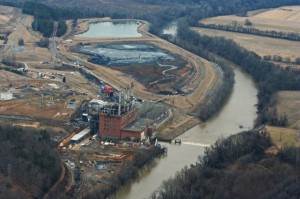Front Porch Blog

A N.C. court ruled that Appalachian Voices and our allies can intervene in a state lawsuit against Duke Energy for its coal ash pollution. Photo by Waterkeeper Alliance.
This week a North Carolina Superior Court ruled that conservation groups representing the interests of communities living near coal ash ponds are able to participate in a lawsuit between Duke and the N.C. Department of Environment and Natural Resources for documented, illegal coal ash pollution at all 14 of Duke Energy’s coal plants in the state.
The Southern Environmental Law Center will represent 12 environmental groups in court, including Appalachian Voices. We will be advocating for the proper cleanup and storage of coal ash at Duke Energy’s Belews Creek Power Plant outside of Winston-Salem. Belews Creek is home to the largest coal ash pond in the state and for decades the surrounding community has suffered serious, and sometimes fatal health conditions that may be connected to heavy metals and other toxins found in coal ash. Watch our video, “At What Cost?”, to hear some of their stories.
The judge’s ruling allows Appalachian Voices, along with the Southern Alliance for Clean Energy, the Western North Carolina Alliance, Sierra Club and several riverkeepers to have access to Duke and DENR documents relating to the area they serve. It also grants conservation groups an equal voice with Duke and DENR in the court proceedings and settlement agreement. Previously, DENR proposed a sweetheart settlement requiring Duke to pay an insignificant fine of $99,000 and merely study the illegal pollution at two of its coal plants. Due to public pressure, DENR has since retracted that settlement proposal.
The ruling is an important step forward for communities long overburdened with coal ash pollution. “It’s essential that local community groups be full parties in the enforcement actions to ensure that Duke Energy’s illegal coal ash pollution is cleaned up and that the coal ash is moved to safe, dry storage in lined landfills away from our waterways,” says Frank Holleman, senior attorney for SELC. “We’ve learned the hard way that the people of North Carolina cannot count on DENR to enforce the laws and keep our waters clean without strong pressure from conservation groups.”
PREVIOUS
NEXT
Related News

Leave a comment
Your email address will not be published. Required fields are marked *
